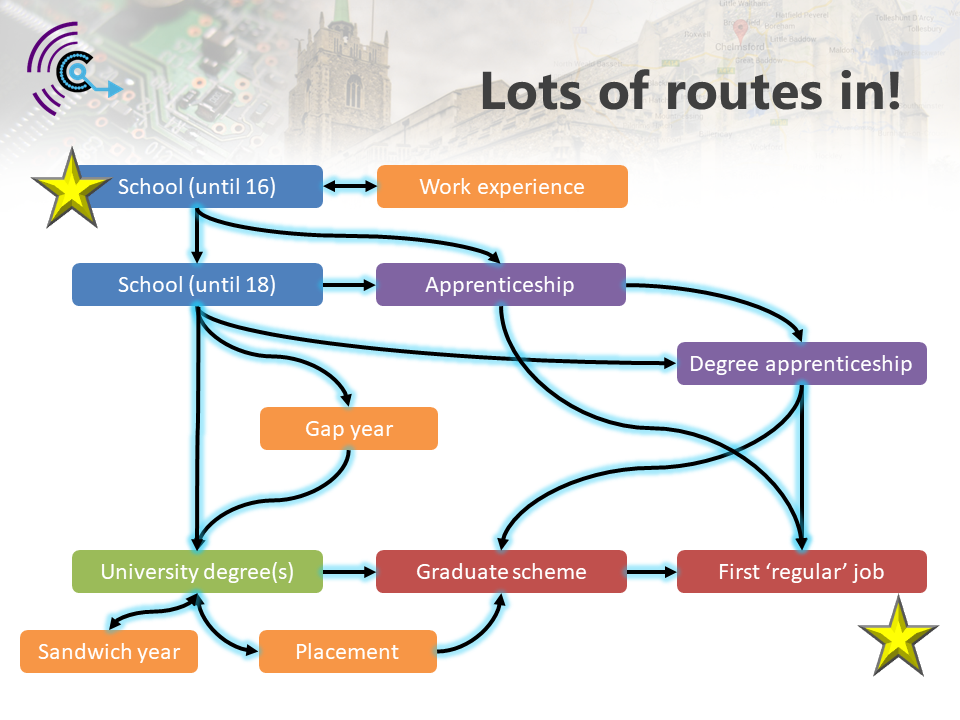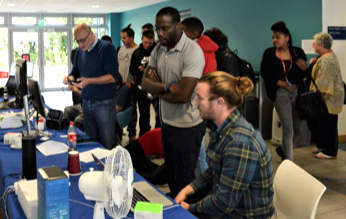Because they are critical to society and the economy, the science, technology and engineering sectors actively seek talented students from schools, colleges and universities.
There are plenty of ways in, including paid placements, apprenticeships and graduate schemes, and unpaid work experience. A selection of options and some basic guidance is below.
Looking for specific career opportunities? Check out our careers and volunteering pages.
Careers videos and podcasts
A selection of videos and podcasts from CSES and local employers (see more below) that talk about and showcase careers in STEM.
Local employers
Companies in Essex who offer work experience, placements and other opportunities.
-
BAE Systems: Early Careers
Apprenticeships, Graduate scheme, Undergraduate placements. Click through to Cyber (Applied Intelligence) for a point of contact at Great Baddow if you just want to submit a CV for consideration.
-
Leonardo: Work experience
Leonardo in Basildon offer a structured week-long work experience programme. Applications open around October each year. Select Basildon then email to apply.
-
Leonardo: Industrial internships
Leonardo also offer paid six-month to one-year placements in all areas of the business, to support and enhance students' studies.
-
Leonardo: Summer placements
Paid summer placements for students in the holidays before or between years at university. A good way to get onto the graduate scheme!
-
Leonardo: Apprenticeships
A highly-regarded 2-4 year apprenticeship programme covering hardware and software engineering, business and cyber security.
-
Teledyne e2v: Apprenticeships
An award-winning apprenticeship scheme that provides you with the opportunity to work with the brightest in the engineering world.
-
Teledyne e2v: Work Experience
Structured work experience placements covering all areas of the business ranging from one day to four weeks, in both term time and holidays.
National schemes
National work experience and placement schemes to help get students started on their careers.
-
Nuffield Research Placements
Spend your summer holiday after year 12 working on an engaging, hands-on research project at a host company.
-
Year in Industry (YINI)
Paid placements lasting 10-12 months in top UK companies for students in year 13 or at undergraduate level.
Confused by all the options?
You're probably not alone. Here is a quick glossary to help you out:
| Work experience |
15-19 |
An unpaid, short-term arrangement (typically a week or two) where a student works with a company either on a structured project or shadowing one or more staff members. The student may get to work on real projects. |
|---|---|---|
| Industrial placement / internship |
19-25 |
A paid placement lasting a full academic year (6-12 months contract length) where a student works full-time with a company on real projects. The student is a full employee and may be invited back for future employment. The company may make a contribution towards university fees as part of the package.
|
| Summer placement |
19-25 |
A paid placement on the same basis as the above but typically lasting 8-16 weeks during the summer holidays between years at university or immediately after leaving school. |
| Graduate scheme |
21+ |
For recent graduates starting as regular employees. Typically eligible to those who have graduated within the last 5 years, they last 2-4 years and involve either rotation among different parts of the business or targeted placement on a serious project. Sometimes a structured training / development programme is attached, for example working towards Chartered status. |
| Apprenticeship |
16+ |
An alternative to university, where a student leaves school at 16 or 18 and starts working straight away with a company. With the clear advantage of being paid from day one, apprentices typically get 1-2 days per week of dedicated training at a local college or university, alongside their regular work which will include rotated placements. |
| Degree / higher apprenticeship |
18+ |
Apprenticeships in which the apprentice completes a full degree (Bachelors or Masters) as part of their training. This is a higher qualification than the Certificates or Diplomas associated with 'regular' apprenticeships. |























